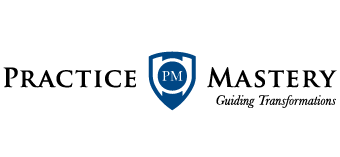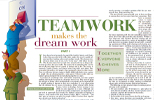Teamwork Makes the Dream Work Pt.II
Never before in the history of the workplace has the concept of teamwork been more important to the functioning of successful organizations. The same is true for the business of dentistry. With the rapid social, technological and informational changes that are occurring, the landscape in which we practice dentistry is quite different today from even 10 years ago. Everything we can do for our patient today is more complex and more technologically advanced. With these advancements come new and emerging challenges that require dental teams to work together in deeper and more creative ways. No longer can we depend upon a few peak performers to rise to the top and carry the growth of our practice. The most successful teams will be those who can figure out ways to tap into the collective creativity and unique abilities of all team members.
It is important for practice leaders to recognize that the modern employee has evolved from early 19th century traditional work values. Merely working for money and to make the boss happy is no longer satisfying to the 21st century dental professional. Today people want more in order to feel fulfilled. They want to be challenged with meaningful work, they want to feel recognized and appreciated for their efforts, and they need to feel a sense of growth in their careers either through promotion or by constantly reinventing what they do each day. Today’s employee will be most excited and committed to their place of employment when they have a voice in the organization and when they are provided a platform from which to exercise their strengths and creativity.
This is why taking time out of our practice to work on our practice is so important. Well-run team meetings are the key to creating whatever we want in our practice and in our professional lives. It is important to recognize that well-run team meetings achieve much more than just an action plan for solving problems. They increase each individual team member’s ownership and commitment to the growth of the business. Meetings get people involved. They unleash the creative powers and collective wisdom of your people. They fuel an atmosphere of camaraderie, which will transform a work environment from a culture of “ME” to a culture of “WE”!
If meetings are so important then why do so many practices have them so infrequently? It is my experience that the average dental office holds approximately one meeting per month and usually not all members of the team are present. Wow! Let’s compare this to the world of sports where having a synchronized united team is the difference between winning and losing. The average sports team holds an average of three practices per game played. Compare this to the world of dentistry where we are often hesitant to take time out of our schedule to have even one planning meeting (practice) per month due to a “short sighted fear” of losing production time. Our doors are open approximately 175 hours/month serving customers (playing the game of dentistry) yet we take only 1-2 hours/month for planning the growth and development of our business. Take a moment to compare these ratios. No wonder so many practices hit a ceiling where further growth without working proportionately harder is no longer possible.
In the words of Abraham Lincoln, “If I had two hours to chop down a tree I would spend one hour sharpening my axe.” How many of us in our practice are chopping with a dull axe each day, or an axe that at the very least could be a little bit sharper. When our axe is dull everything we do takes more effort, more time and more energy, only to produce the same results. It is very difficult and rather dangerous to attempt to sharpen our axe while we’re busy swinging it. Similarly in dentistry, it is very difficult and it breeds confusion and stress to attempt to plan/implement new initiatives while you’re busy serving customers
Keep in mind that simply having a meeting isn’t enough to guarantee success. How many times have we walked away from a meeting feeling emotionally frustrated and nothing really changed. This is where leadership becomes really important. It is the practice leader’s responsibility to cultivate a workplace atmosphere that fosters five core conditions required for successful meetings to take place. When these are absent your meeting effectiveness will be severely compromised:
- Environment of trust… individual team members must trust each other and feel safe to expose their strengths, weaknesses and views while being vulnerable within the group.
- Comfort in brainstorming… team members must trust each other enough to engage in unfiltered and passionate debateof ideas. People must be genuinely open to debate without resorting to veiled discussions and guarded comments.
- Unconditional commitments… after airing their opinions in the course of passionate and open debate, team members must buy in and commit to group decisions without silently nursing their commitment to old ways of doing things.
- Supportive cross-team accountability… it is up to each of us on the team to support our peers and comment on each other’s actions and behaviors when they begin to steer astray from commitments made in meetings.
- Monitor progress… we must constantly review, track and tweak new initiatives until they are fully in effect and feel natural.
- Creative innovation/reinvention… we must continuously reexamine our activities, especially the ones that seem to be working. Can we find new and innovative ways to achieve our goals each day? Can we align our activities to better meet the changing landscape of business and clinical dentistry?
We must walk away from each team meeting with a deeper sense of our circumstances and opportunities and with a clear set of strategies for moving in the direction of our goals. Meetings must not become gripe sessions. They should draw from the collective wisdom of the group and allow all team members to be an integral part of running the business. Regardless of what role you play in the practice, everyone’s perspective and ideas are powerful ingredients for planning the growth and development of your business. I have seen dental teams walk out of well-run team meetings with ideas and strategies that none of them would have ever been able to come up with on their own. As the saying goes… “None of us is as smart as all of us.” Over the years I have compiled a list of the most common things that seem to consistently destroy productive meetings. Has your team ever fallen victim to any of these?
- No clear pre-planned purpose or agenda
- Not enough time scheduled.
- Taking our eye off the ball by getting personal and territorial.
- Whole team not present.
- Negativism and lack of creative involved enthusiastic participation.
- Remaining open / answering phones / serving customers during meetings.
- Eating during meetings.
- Not taking notes.
- Drifting off topic with no “facilitator” to keep us focused and on track.
- No clear set of walk away strategies (what exactly will each of us do differently from now on?).
- No follow-up plan to monitor strategies and track results.
Finally, give careful thought to your meeting process, and design it to bring your people together. If the whole thing is a one-way flow of information, with one person at the head of the table doing all the talking, it won’t stimulate much unity or positive change. If you want to experience a constant sense of growth and achievement in your dental office then regular, well planned and well executed full team meetings are the ticket to your dreams. As a dental business we play a very important role in society. We don’t sell dentistry. We help our patients live a better life. We provide happiness through the medium of dentistry. Carefully planned well run team meetings are the gravity that will pull your people together and organize your collective activities under the umbrella of this common theme.


 Originally Published in
Originally Published in 
